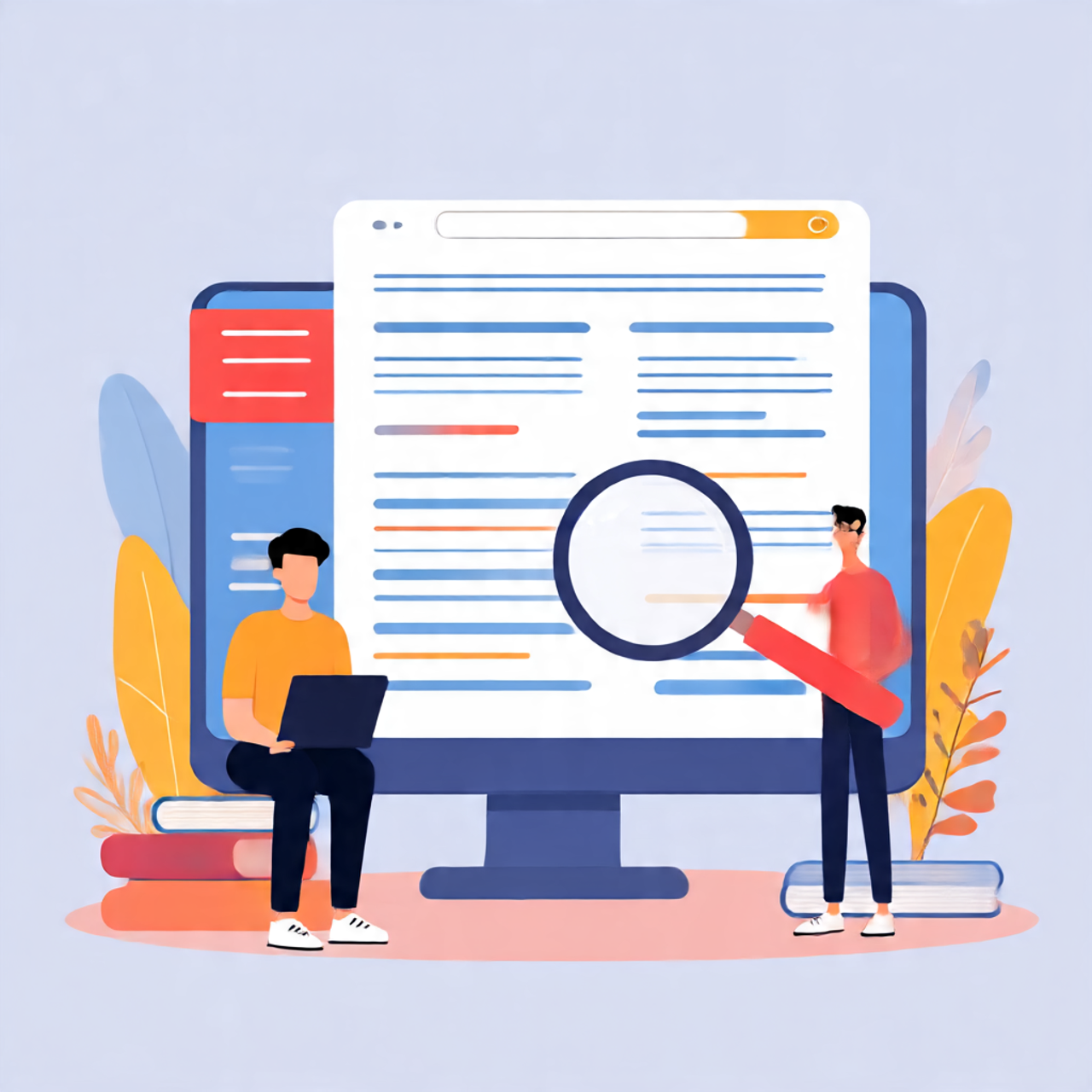
The Ultimate Guide to Off-Page SEO for Beginners
Master off-page SEO with this beginner's guide. Learn link building, backlinks, brand mentions, and proven strategies to boost your search rankings organically.

You have spent weeks perfecting your website. Your content is polished, your keywords are optimized, and your site loads faster than ever. But despite all this effort, your rankings are stuck, and your competitors are somehow pulling ahead. What are they doing that you are not?
The answer lies beyond your website itself. While on-page SEO handles everything you control on your site, off-page SEO is where the real magic happens in the eyes of search engines. Think of it this way: on-page SEO is what you say about yourself, while off-page SEO is what others say about you. And we all know that recommendations from trusted sources carry way more weight than self-promotion.
This comprehensive guide will walk you through everything you need to know about off-page SEO for beginners. You will discover how backlinks, brand mentions, social signals, and strategic partnerships can transform your website from invisible to unmissable in search results. Whether you are running a small blog, an e-commerce store, or a local business, mastering these techniques will help you build the authority and trust that search engines reward with higher rankings. Ready to take your SEO game beyond your website? Let's get started.
What is Off-Page SEO?
Off-page SEO refers to all the optimization activities that happen outside your website to improve your search engine rankings. Unlike on-page SEO, which focuses on elements you directly control like content quality, meta tags, and site structure, off-page SEO is about building your website's reputation and authority across the internet.
When Google and other search engines evaluate your site, they look at signals from around the web to determine whether you deserve to rank highly. The most important of these signals are backlinks (links from other websites pointing to yours), but off-page SEO encompasses much more. It includes brand mentions, social media engagement, online reviews, local citations, influencer partnerships, and your overall digital presence.
Think of off-page SEO as building your website's credibility in the eyes of both search engines and real users. When authoritative websites link to your content, when people talk about your brand positively, and when your business appears across multiple trusted platforms, search engines interpret these as votes of confidence. The stronger these trust signals, the better your chances of ranking higher in the search engine results pages (SERPs).
Why Off-Page SEO Matters for Rankings
Search engines like Google use complex algorithms to determine which websites deserve the top spots. While high-quality content matters, it is not enough on its own. PageRank, one of Google's core ranking systems introduced by founders Larry Page and Sergey Brin, fundamentally relies on analyzing how pages link to each other.
Research consistently shows that backlinks remain one of the top three ranking factors. Websites with strong backlink profiles from authoritative sources significantly outperform those without, especially for competitive keywords. According to various SEO studies from Moz, there is a clear correlation between the number of quality referring domains and higher search rankings.
But beyond just links, Google's Quality Rater Guidelines emphasize evaluating a website's off-site reputation. This is particularly important for YMYL (Your Money or Your Life) topics like health, finance, and legal advice. Search engines want to see what others say about you on news sites, review platforms, forums, and across the broader web.
Off-page SEO also helps with:
- Building domain authority and establishing your site as a trusted resource
- Driving referral traffic from other websites and platforms
- Increasing brand awareness and recognition across your industry
- Improving local search visibility for businesses with physical locations
- Supporting your E-E-A-T signals (Experience, Expertise, Authoritativeness, Trustworthiness)
Off-Page SEO vs On-Page SEO: Understanding the Difference
Many beginners confuse these two essential SEO components, so let's clear this up once and for all.
On-page SEO is everything you control directly on your website. This includes creating high-quality content, optimizing title tags and meta descriptions, using proper heading structure, improving page speed, adding alt text to images, implementing internal linking, and ensuring mobile-friendliness. You have complete control over these elements and can implement changes immediately.
Off-page SEO, however, involves activities that happen outside your site. You are working to influence how the rest of the internet perceives and references your website. This includes earning backlinks from other sites, getting mentioned in news articles, building your social media presence, collecting customer reviews, and appearing in industry directories. The key difference is that you have less direct control over these factors.
Here is another way to think about it: on-page SEO makes sure your house is well-built and organized, while off-page SEO ensures people in the neighborhood know about it and recommend it to others.
Both strategies work together. Excellent on-page optimization makes your content more linkable, which supports your off-page efforts. Meanwhile, strong off-page signals tell search engines that your well-optimized content deserves to rank highly. Neglecting either one creates an imbalance that limits your SEO potential.
Technical SEO deserves a mention here too. This third pillar focuses on the backend elements that help search engines crawl and index your site efficiently, including site architecture, XML sitemaps, robots.txt files, and structured data. While it overlaps with on-page SEO, its focus is specifically on search engine accessibility rather than user-facing content.
The Core Elements of Off-Page SEO
Let's break down the fundamental components that make up a strong off-page SEO strategy.
Backlinks: The Foundation of Off-Page SEO
Backlinks (also called inbound links or external links) are links from other websites that point to your site. They function like digital votes of confidence. When a reputable website links to your content, it signals to search engines that your page provides valuable information worth referencing.
Not all backlinks are created equal. A single quality backlink from an authoritative, relevant site in your industry carries far more weight than dozens of links from low-quality, unrelated websites. Search engines evaluate backlinks based on several factors:
Relevance: Links from websites in your niche or industry are more valuable than random links. If you run a fitness blog, a backlink from a health magazine matters more than one from a random recipe site.
Authority: Websites with high domain authority pass more "link equity" (also called link juice) to your site. Tools like Moz's Domain Authority or Ahrefs' Domain Rating help measure this.
Placement: Contextual links embedded naturally within the main content of a page are more powerful than links buried in footers, sidebars, or comment sections.
Anchor Text: The clickable text of the link provides context about your page's content. However, over-optimizing anchor text with exact-match keywords can trigger spam filters. Aim for natural, diverse anchor text.
Link Type: "Dofollow" links pass SEO value, while "nofollow" links tell search engines not to count them for ranking purposes. Both have value in a natural backlink profile.
The number of referring domains (unique websites linking to you) matters more than the total number of backlinks. Getting 100 backlinks from the same website only counts as one referring domain in Google's eyes.
Brand Mentions and Citations
Even when other websites mention your brand without linking to you, these unlinked brand mentions still serve as trust signals. Search engines can detect when your business name, products, or key personnel are discussed across the web, and these mentions contribute to your overall online reputation.
For local businesses, local citations (mentions of your business name, address, and phone number across directories and platforms) are particularly important for local SEO. Consistency across these citations helps search engines verify your business information and improves your visibility in local search results and Google Business Profile rankings.
Monitoring brand mentions also helps you identify opportunities for link reclamation. When you find unlinked mentions on quality websites, you can reach out and politely request that they add a link, turning a simple mention into a valuable backlink.
Social Signals and Social Media Presence
While Google has stated that social signals do not directly impact rankings, having an active social media presence indirectly supports your off-page SEO efforts. Here is how it works:
When you share content on platforms like Facebook, LinkedIn, Twitter, Instagram, or industry-specific networks, you increase its visibility. More eyes on your content means more potential for people to link to it, share it further, and reference it on their own websites.
Social media also helps with:
- Building brand recognition and awareness
- Driving referral traffic to your website
- Engaging directly with your audience and building community
- Amplifying your content's reach beyond your existing followers
- Establishing thought leadership in your industry
Think of social media as a distribution channel rather than a direct ranking factor. The engagement you build there can lead to the backlinks and brand mentions that do impact your search engine rankings.
Online Reviews and Reputation Management
Customer reviews on platforms like Google Business Profile, Yelp, Trustpilot, and industry-specific review sites contribute to your off-page SEO profile. Positive reviews build trust with potential customers and signal to search engines that your business provides quality products or services.
For local businesses especially, reviews are critical. The quantity and quality of your Google reviews directly influence your visibility in local search results and Google Maps rankings. Encouraging satisfied customers to leave reviews and responding professionally to all feedback (positive and negative) strengthens your online reputation.
Online reputation management extends beyond just reviews. It includes managing your presence across forums, social media, news sites, and anywhere else your brand is discussed. Negative press or widespread complaints can harm both your reputation and your search visibility for branded searches.
Proven Off-Page SEO Strategies for Beginners
Now that you understand the fundamentals, let's explore practical link building strategies you can implement right away.
Create Link-Worthy Content
The foundation of any successful off-page SEO strategy is creating content that people naturally want to link to. This means producing resources that provide genuine value, unique insights, or information that does not exist elsewhere.
Some types of content that attract backlinks naturally include:
Original Research and Data: Publishing original studies, surveys, or data analysis gives other websites a reason to cite your work. When you become the source of statistics or findings, you position yourself as an authority.
Comprehensive Guides: In-depth, well-researched guides that cover topics thoroughly (like this one) become go-to resources that people reference and link to repeatedly.
Visual Content: Infographics, charts, diagrams, and data visualizations are highly shareable and linkable because they present complex information in digestible formats.
Case Studies: Detailed examinations of real-world examples, successes, or failures provide practical insights that others want to reference.
Tools and Resources: Free calculators, templates, checklists, or interactive tools that solve specific problems naturally earn links from users who find them valuable.
Focus on creating content with "information gain," meaning it provides perspectives, analysis, or details not readily available elsewhere on the web. The more unique and valuable your content, the more likely others will link to it.
Guest Blogging and Guest Posting
Guest blogging involves writing articles for other websites in your industry or niche. This strategy serves multiple off-page SEO purposes: it builds backlinks, expands your reach to new audiences, establishes your expertise, and creates networking opportunities with other content creators.
To get started with guest posting:
-
Identify reputable websites in your industry that accept guest contributions. Look for sites with strong domain authority and engaged audiences.
-
Study their existing content to understand their style, topics, and audience expectations.
-
Pitch unique, valuable article ideas that align with their content strategy but fill gaps in their existing coverage.
-
Write high-quality, well-researched articles that provide genuine value to their readers. Do not write promotional content.
-
Include 1-2 relevant backlinks to your site within the article or author bio, focusing on natural placement rather than keyword stuffing.
Remember that quality trumps quantity. One guest post on an authoritative, relevant site provides more SEO value than dozens of posts on low-quality blogs. Focus on building genuine relationships with other content creators rather than treating guest posting as a transactional link exchange.
Broken Link Building Strategy
Broken link building is a win-win tactic where you help website owners fix dead links while earning backlinks for yourself. Here is how it works:
-
Use tools like Ahrefs, SEMrush, or Check My Links to find broken links (404 errors) on websites in your niche.
-
Create or identify content on your site that serves as a suitable replacement for the broken link.
-
Reach out to the website owner, politely informing them about the broken link and suggesting your content as an alternative.
-
Most webmasters appreciate being notified about broken links since they harm user experience and SEO. Many will gladly update the link if your content is a good fit.
This strategy is particularly effective when targeting resource pages, blog posts with outdated links, or pages that previously linked to competitors whose content no longer exists.
The Skyscraper Technique
Developed by SEO expert Brian Dean, the Skyscraper Technique involves finding high-performing content in your niche, creating something even better, and promoting it to people who linked to the original.
Here is the step-by-step process:
-
Use tools like Ahrefs or BuzzSumo to identify popular content with many backlinks in your topic area.
-
Analyze why that content attracted links. What made it valuable?
-
Create an improved version that is more comprehensive, more current, better designed, or provides additional value the original lacked.
-
Identify websites that linked to the original content using backlink analysis tools.
-
Reach out to those websites, inform them about your improved resource, and suggest they might want to reference it instead or in addition to the original.
The key to success with this technique is genuinely creating superior content. Simply republishing similar information will not work. You need to provide something meaningfully better that gives websites a legitimate reason to link to your version.
Build Relationships Through Digital PR
Digital PR combines traditional public relations with modern link building strategies. It involves getting your brand, products, or expertise featured in news publications, industry blogs, and authoritative media outlets.
Effective digital PR tactics include:
HARO (Help A Reporter Out): Journalists use this platform to find expert sources for their articles. By responding to relevant queries with thoughtful, quotable insights, you can earn mentions and backlinks in major publications.
Press Releases for Newsworthy Events: When you launch new products, achieve significant milestones, or have genuinely newsworthy announcements, distributing press releases can attract media attention and backlinks.
Conducting Original Research: Publishing studies, surveys, or data analysis that reveals new insights attracts journalists looking for data to support their stories.
Building Journalist Relationships: Following and engaging with journalists who cover your industry on social media can lead to future opportunities for quotes, interviews, and features.
Creating Visual Content for Media: Offering high-quality images, infographics, or data visualizations that journalists can use in their articles increases the likelihood of being cited.
The key to successful digital PR is providing genuine value to journalists and their audiences rather than just seeking links. Focus on contributing expertise and unique information that enhances their stories.
Leverage Influencer Partnerships and Collaborations
Working with influencers and thought leaders in your industry can significantly boost your off-page SEO through increased visibility, backlinks, and brand mentions. According to research, 92% of consumers trust recommendations from individuals over brands.
Ways to collaborate with influencers include:
- Co-creating content like interviews, roundups, or collaborative articles
- Podcast appearances where you share expertise while earning backlinks from show notes
- Product reviews or mentions from trusted voices in your niche
- Social media takeovers or partnerships that expose your brand to new audiences
- Joint webinars or events that provide mutual value
When approaching influencers, focus on how the partnership benefits both parties. Offer genuine value rather than just asking for favors, and build authentic relationships over time.
Optimize Your Google Business Profile and Local Listings
For businesses with physical locations or those serving specific geographic areas, optimizing your Google Business Profile and appearing in relevant local directories is crucial for off-page SEO.
Best practices include:
Complete Your Profile Thoroughly: Fill out every section of your Google Business Profile, including business hours, services, photos, and detailed descriptions.
Maintain NAP Consistency: Ensure your Name, Address, and Phone number are identical across all platforms and directories. Inconsistencies confuse search engines and hurt local rankings.
Collect and Respond to Reviews: Actively encourage satisfied customers to leave reviews, and respond professionally to all feedback. Review quantity and quality impact local search visibility.
Post Regular Updates: Use the posts feature on Google Business Profile to share updates, offers, and content, similar to social media posts.
Build Local Citations: Get listed in relevant local directories, industry-specific platforms, and community websites. Each citation reinforces your business's legitimacy and location.
Local SEO and off-page optimization work hand-in-hand for businesses targeting specific geographic markets. The more consistent, positive signals you create across local platforms, the better your local search visibility.
Engage in Community Building and Forum Participation
Participating authentically in online communities, forums, and discussion platforms in your industry builds your reputation and can lead to natural backlinks and brand mentions.
Effective community engagement includes:
Providing Genuine Help: Answer questions thoroughly on platforms like Reddit, Quora, industry forums, and LinkedIn groups without being overly promotional.
Sharing Your Expertise: Contribute valuable insights that establish you as knowledgeable in your field.
Including Relevant Links When Appropriate: When your content genuinely answers someone's question, linking to it provides value. However, spamming links will get you banned and harm your reputation.
Building Relationships: Regular, helpful participation builds trust and recognition. Over time, community members may naturally mention or link to your content.
The key is authenticity. Communities quickly identify and reject obvious self-promotion. Focus on genuinely helping others and providing value, and the SEO benefits will follow naturally.
Essential Tools for Off-Page SEO
Successfully implementing and monitoring your off-page SEO efforts requires the right tools. Here are the most valuable platforms for beginners:
Ahrefs: One of the most comprehensive SEO tools available, Ahrefs excels at backlink analysis. You can see who links to your site, analyze competitor backlink profiles, find link building opportunities, track your progress, and identify broken links to target.
SEMrush: Another all-in-one SEO platform that offers backlink tracking, competitor analysis, brand monitoring, and outreach tools. Its Backlink Analytics feature provides detailed insights into your link profile.
Moz Link Explorer: Moz's tool offers backlink analysis and provides the widely-used Domain Authority metric. It helps you evaluate the quality of potential link opportunities.
Google Search Console: This free tool from Google shows you which sites link to yours, which of your pages receive the most backlinks, and how your site performs in search results.
Google Alerts: Set up alerts for your brand name, products, or key personnel to monitor brand mentions across the web. This helps you identify unlinked mentions you can convert to backlinks.
BuzzSumo: Excellent for finding popular content in your niche that has earned many backlinks, making it ideal for the Skyscraper Technique and identifying trending topics.
Majestic: Specializes in backlink analysis with unique metrics like Trust Flow and Citation Flow that evaluate link quality.
Most of these tools offer free trials or limited free versions, allowing you to explore their features before committing. As a beginner, start with free tools like Google Search Console and gradually invest in paid platforms as your needs and budget grow.
Common Off-Page SEO Mistakes to Avoid
Even well-intentioned beginners can stumble into practices that hurt rather than help their search rankings. Here are critical mistakes to avoid:
Focusing on Quantity Over Quality
One of the biggest misconceptions is that more backlinks automatically mean better rankings. In reality, 10 high-quality backlinks from authoritative, relevant sites provide far more value than 100 low-quality links from random directories or spammy websites.
Google's Penguin algorithm specifically targets unnatural link patterns and low-quality link schemes. Focus on earning links from reputable sources that genuinely add value for their audiences.
Buying Backlinks
Purchasing backlinks violates Google's Webmaster Guidelines and can result in severe penalties, including complete removal from search results. While it might be tempting to buy your way to more links, the risk far outweighs any short-term gains.
Search engines have become sophisticated at detecting paid link schemes, private blog networks, and other manipulative tactics. Instead, invest your resources in creating quality content and building genuine relationships that earn links naturally.
Over-Optimizing Anchor Text
Using exact-match keyword anchor text for every backlink looks unnatural and can trigger spam filters. A natural backlink profile includes diverse anchor text: branded terms, generic phrases like "click here," partial matches, and exact matches in moderation.
Aim for an anchor text distribution that looks organic, with your brand name being the most common anchor text, followed by variations and occasional keyword-rich anchors.
Ignoring Link Relevance
Links from websites completely unrelated to your industry provide minimal value and can even raise red flags if your profile is dominated by irrelevant links. Prioritize quality links from sites in your niche or complementary industries.
Neglecting to Monitor Your Backlink Profile
Not all backlinks are good. Negative SEO attacks, spammy directories, and low-quality sites can link to you without your knowledge, potentially harming your rankings. Regularly audit your backlink profile using tools like Google Search Console or Ahrefs.
When you identify toxic backlinks, use Google's Disavow Tool to tell search engines to ignore those links when evaluating your site.
Copying Competitor Tactics Without Strategy
While analyzing competitor backlinks provides valuable insights, blindly copying their exact strategy without understanding your unique value proposition rarely works. Instead, use competitor analysis to identify opportunities and gaps, then develop your own approach.
Measuring Off-Page SEO Success
How do you know if your off-page SEO strategy is working? Track these key metrics:
Organic Traffic Growth: Monitor increases in visitors from search engines using Google Analytics. Growing organic traffic indicates improving search visibility.
Keyword Rankings: Track your positions for target keywords over time. Tools like SEMrush, Ahrefs, or free options like Google Search Console show ranking improvements.
Number of Referring Domains: Watch how many unique websites link to you. This metric matters more than total backlink count.
Domain Authority / Authority Score: While not direct ranking factors, metrics like Moz's Domain Authority or Ahrefs' Domain Rating help gauge your site's overall authority compared to competitors.
Branded Search Volume: Increases in people searching for your brand name indicate growing awareness, a positive off-page signal.
Referral Traffic: Monitor how much traffic comes from backlinks. Quality links should drive engaged visitors to your site.
Brand Mentions: Track mentions of your brand across the web, both linked and unlinked.
Set clear goals at the outset of your off-page SEO efforts using the SMART framework (Specific, Measurable, Achievable, Relevant, Time-bound). For example: "Earn 20 high-quality backlinks from websites with Domain Authority above 40 within six months."
Regular monitoring allows you to identify what's working, double down on successful strategies, and pivot away from tactics that aren't delivering results.
How Long Does Off-Page SEO Take to Show Results?
One of the most common questions beginners ask is: "How quickly will I see results from off-page SEO?"
The honest answer is that off-page SEO is a long-term investment. Unlike on-page changes that search engines can detect and respond to within days or weeks, building authority through backlinks and brand recognition takes months to show significant impact.
Here is a realistic timeline:
1-3 Months: You begin building relationships, creating linkable content, and implementing initial strategies. Search engines start discovering new backlinks, but ranking changes remain minimal.
3-6 Months: With consistent effort, you start seeing gradual improvements in rankings for less competitive keywords. Your domain authority slowly increases as quality backlinks accumulate.
6-12 Months: Substantial results become visible. Your site gains noticeable traction for competitive keywords, organic traffic increases significantly, and your authority in your niche strengthens.
12+ Months: Your compound efforts pay off. Earlier links continue providing value, your growing authority makes earning new links easier, and your competitive position strengthens considerably.
The timeline varies based on your niche's competitiveness, the quality of your efforts, your starting point, and your consistency. Highly competitive industries require more time and effort than niche markets with less competition.
The key is patience and persistence. Off-page SEO success comes from consistent, strategic effort over time rather than quick fixes or shortcuts.
Creating Your Off-Page SEO Action Plan
Ready to implement what you have learned? Here is a practical action plan for beginners:
Month 1: Foundation and Research
- Audit your current backlink profile using Google Search Console or a free trial of Ahrefs
- Research competitors to identify their link sources and strategies
- Identify 10-15 websites in your niche that could be potential link opportunities
- Create or optimize content on your site that is genuinely link-worthy
- Set up Google Alerts for your brand and key industry terms
Month 2: Initial Outreach and Content Creation
- Write and publish 2-3 pieces of high-quality, comprehensive content
- Identify 5 broken links on relevant websites and prepare outreach emails
- Pitch 3-5 guest post ideas to target websites
- Optimize your Google Business Profile if applicable
- Begin engaging authentically in 2-3 industry forums or communities
Month 3: Expansion and Relationship Building
- Follow up on previous outreach efforts
- Publish your first guest post if accepted
- Create a valuable resource (guide, infographic, or tool) designed for links
- Identify and respond to 3-5 HARO queries in your expertise area
- Continue community engagement and content creation
Month 4-6: Scaling and Monitoring
- Analyze which strategies generated the best results and double down
- Expand guest posting to additional publications
- Implement the Skyscraper Technique for 1-2 pieces of competitor content
- Build relationships with 2-3 influencers through authentic engagement
- Monitor metrics weekly and adjust strategy based on what's working
Remember to document your efforts in a spreadsheet, tracking outreach sent, responses received, links earned, and the domain authority of linking sites. This helps you identify patterns and optimize your approach over time.
Conclusion
Off-page SEO is not some mysterious black box. It is about building genuine authority, earning trust from both search engines and real people, and establishing your website as a valuable resource worth referencing. While mastering off-page optimization takes time and consistent effort, the results compound over months and years, creating sustainable organic traffic growth that paid advertising cannot match. Start with the fundamentals: create genuinely valuable content, focus on earning quality backlinks from relevant sources, build your brand presence across appropriate platforms, and engage authentically with your industry community. Avoid shortcuts like buying links or spamming, as these tactics cause more harm than good in the long run. Use the strategies, tools, and action plan outlined in this guide to develop your own customized approach. Remember that off-page SEO works best when combined with solid on-page optimization and technical SEO, creating a comprehensive strategy that addresses all aspects of search engine visibility. Be patient, stay consistent, and focus on providing real value rather than gaming the system, and you will build the authority and rankings that drive long-term business success.







